Farm Business Advisors (FBA) overcome the last mile distribution gap of agricultural information and technology to small-scale farmers. Of all the iDE country FBA programs, Bangladesh has hosted the largest and most diverse. In this blog, Jeremy Davis and Abir Chowdhury share their experiences from promoting FBAs in Bangladesh.
CONTEXT
Since our inception, iDE (International Development Enterprises) has positively impacted the lives of over 30 million people by leveraging technologies, supply chains, and market systems to increase both agricultural productivity and economic returns for rural farmers and microenterprises. In the decades since our founding in the early 1980s, we have maintained agriculture for entrepreneurs as a focus, continuously refining our ‘Farm Business Advisor’ (FBA) micro-entrepreneur model, based on evolving local contexts. iDE has developed the FBA role to overcome the last mile distribution gap of agricultural information and technology to small-scale farmers. This has been achieved through a continuous positive feedback loop in rural communities that leverages user insights, product innovation, and business model design, integrated into a simple service model. In addition to filling smallholder demand for hard-to-access quality farm products and services, FBAs also serve as alternative sources of agricultural extension. Although existing public service models are present for extension in Bangladesh’s rural areas, the limited local government investment in extension does not cater to the needs of everyone. FBAs can fill this gap.
THE FBA APPROACH
The FBA approach originated in Cambodia and Nepal in the mid-2000s, quickly expanding across other iDE country programs. FBAs work on a commission basis, providing both inputs and aggregating product for sale to wholesale markets. FBAs are entrepreneurs who go door-to-door and field-to-field, supporting small-scale farmers to grow crops that can be sold for attractive returns. FBAs provide an essential last-mile market link for farmers located in remote areas far away from commercial centres. The model requires FBAs to visit the farmer’s field directly, where they learn what challenges the farmer faces– problems such aslack of irrigation, poor soils, damaging pests, or difficulty getting crops to buyers. Together, the FBA and the farmer work out a strategy, which might include investing in new equipment, like drip irrigation or introducing higher-value crops into their annual agricultural cycle. They sell farmer inputs, such as seeds, fertilizers, drip irrigation kits, and other agricultural tools, earning a commission on each sale. FBAs keep in regular contact with their farmer clients to answer questions, solve problems, and ensure that investments are yielding the expected results.
Consistent with a market facilitation approach, FBAs do not receive any financial support to start their businesses; support is limited to training, capacity building, mentoring, and building linkages with customers, traders and other market actors.
FBAs as private-sector extension agents
In addition to the sale of inputs and outputs, FBAs provide their farmer clients with context-specific market information and agricultural advice. This behavior is purely market-driven, as it helps them retain customers, build trust, and provide a value-added service that traditional inputs retailers and traders cannot. In order to reach the last mile, FBAs are shown how to engage with the private sector to facilitate informational sales and technical training sessions at the community level to promote new products to producer groups.
These sessions place private sector actors, such as company sales representatives, in the role of facilitator at village-level sessions to deliver training on inputs and production practices as embedded product marketing to producer groups. These sessions are initially cost-shared with the private sector, with support gradually phased out until they are convinced of the value and are willing to assume 100% of the costs. An additional success factor for FBAs is the incorporation of production planning into the suite of activities that are done with their smallholder clients. These organized planning sessions are a means to harmonize supply and demand between markets and producers, and allow the FBA to coordinate the inputs they will sell as well as determine volumes of product they will be able to aggregate and sell to buyers at harvest time.
An FBA conducting a meeting with producers.
FBAs complementing public extension
It should be noted that the intent is not for FBAs to replace public sector extension, but rather to complement it as part of a pluralistic extension system. FBAs typically maintain close contact with the local public sector extension agent and consult with them on problems that are beyond their own expertise. They also serve as an ‘extension bridge’ by introducing and linking the public agent to their farmer clients.
Of all the iDE country FBA programs, Bangladesh has hosted the largest and most diverse. Over the course of the last half decade, more than 1,000 FBAs have been trained and supported. The FBA model engages the Government of Bangladesh extension officers while providing support to FBA businesses through attending events and verifying technical advisory information. What the Bangladesh team has discovered is that each FBA is truly a unique business, each having a different business plan to meet its specific challenges and needs. For example, some FBAs are school teachers during the day who spend their evenings selling agricultural inputs, seeds, fertiliser, pesticides, etc., another is a pharmacist who expanded his shop to include quality vegetable seeds. While this may seem daunting, iDE has embraced the diversity of the FBAs in Bangladesh and developed a methodology to support them based on the roles they play in their communities. FBAs self-select whether they provide input or output support (or both) to farmers. Some FBAs had pre-existing agri- businesses and used the training they received to expand their services and offerings. Others were lead farmers with existing associations or farmer groups.
CHALLENGES
Many challenges remain. To date, only 10% of Bangladesh FBAs have been women, mainly due to cultural norms that make it difficult for women to travel alone or interact with men who aren’t in their extended family. Limited access to capital constraints many FBAs from maintaining the working cash flow they need and extending short-term credit to clients. Scalability is an on-going concern as, to date, private sector lead firms, while extremely collaborative, have not shown willingness to adopt the model by recruiting and training FBAs on their own. Finally, as with most market-based approaches, inclusiveness can be a struggle. To grow their business, FBAs tend to focus on more well-off commercial smallholders rather than the poorer market segment who need their products and services the most.The diversity and sizable number of FBAs in the Bangladesh program has supplied a volume of lessons learned, data that iDE continues to analyze and explore as we press forward on increasing the income and improving the lives of the rural Bangladesh population.
Jeremy Davis (jdavis@ideglobal.org) is a Programs Director – Agriculture, iDE Bangladesh
 Abir Chowdhury(abir.chowdhury@ideglobal.org) , working as Food Security and Senior Technical Specialist, respectively.
Abir Chowdhury(abir.chowdhury@ideglobal.org) , working as Food Security and Senior Technical Specialist, respectively.

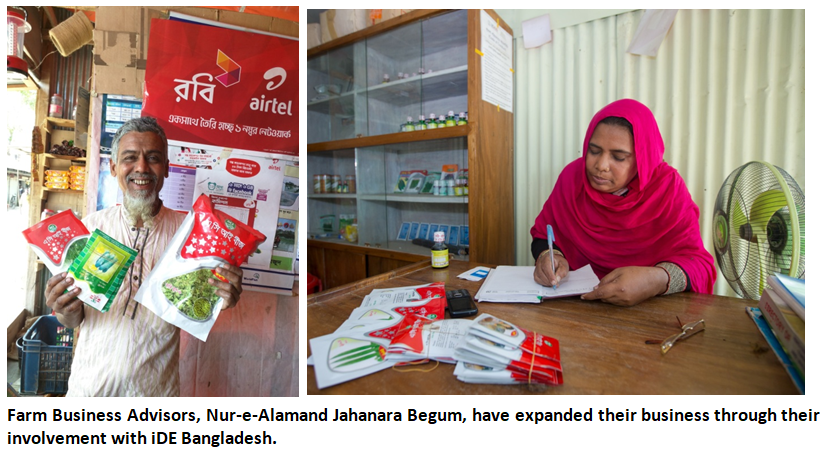
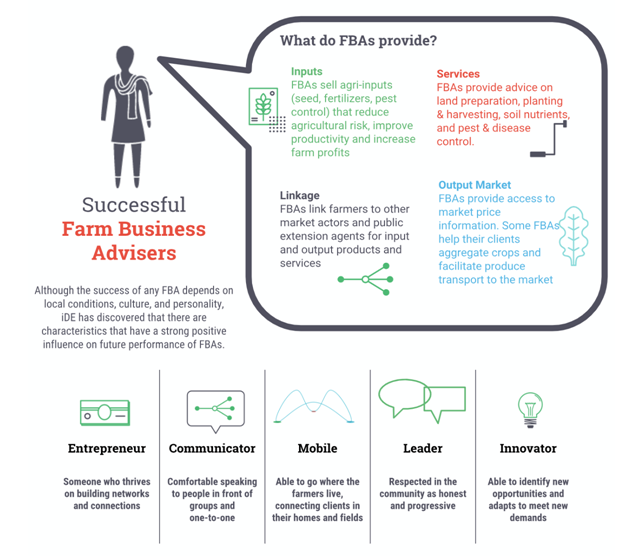



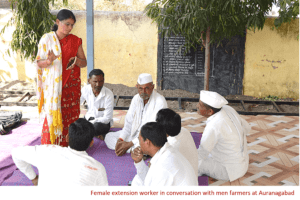
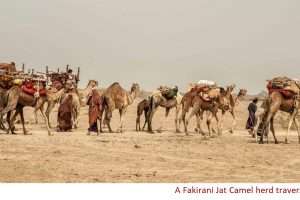
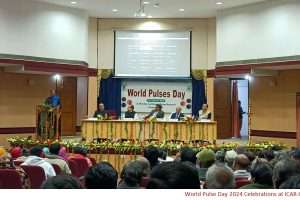
Add Comment